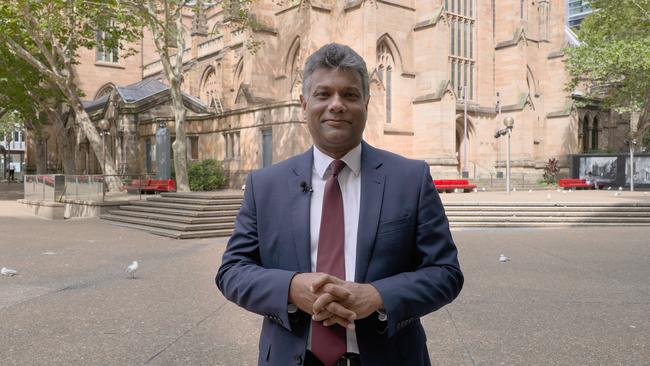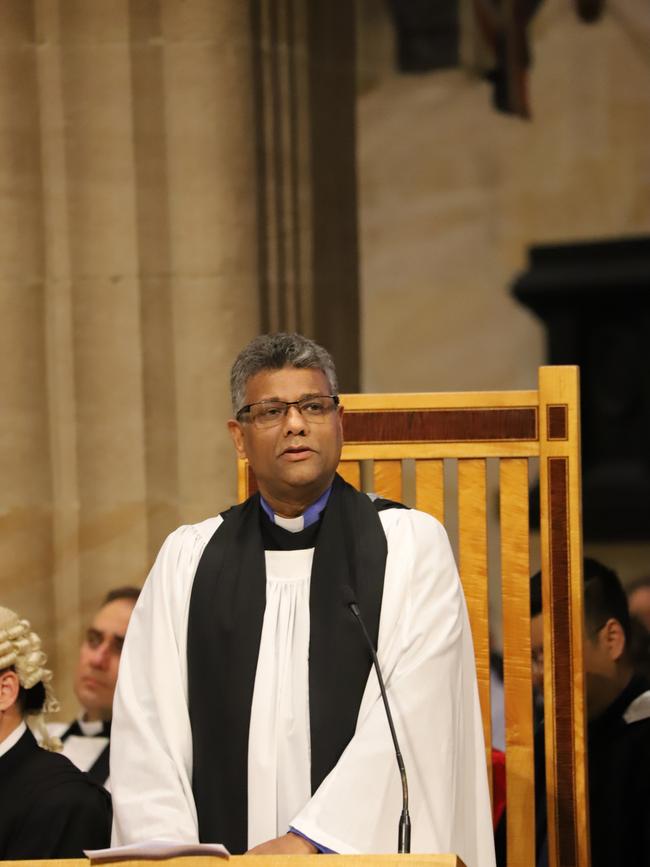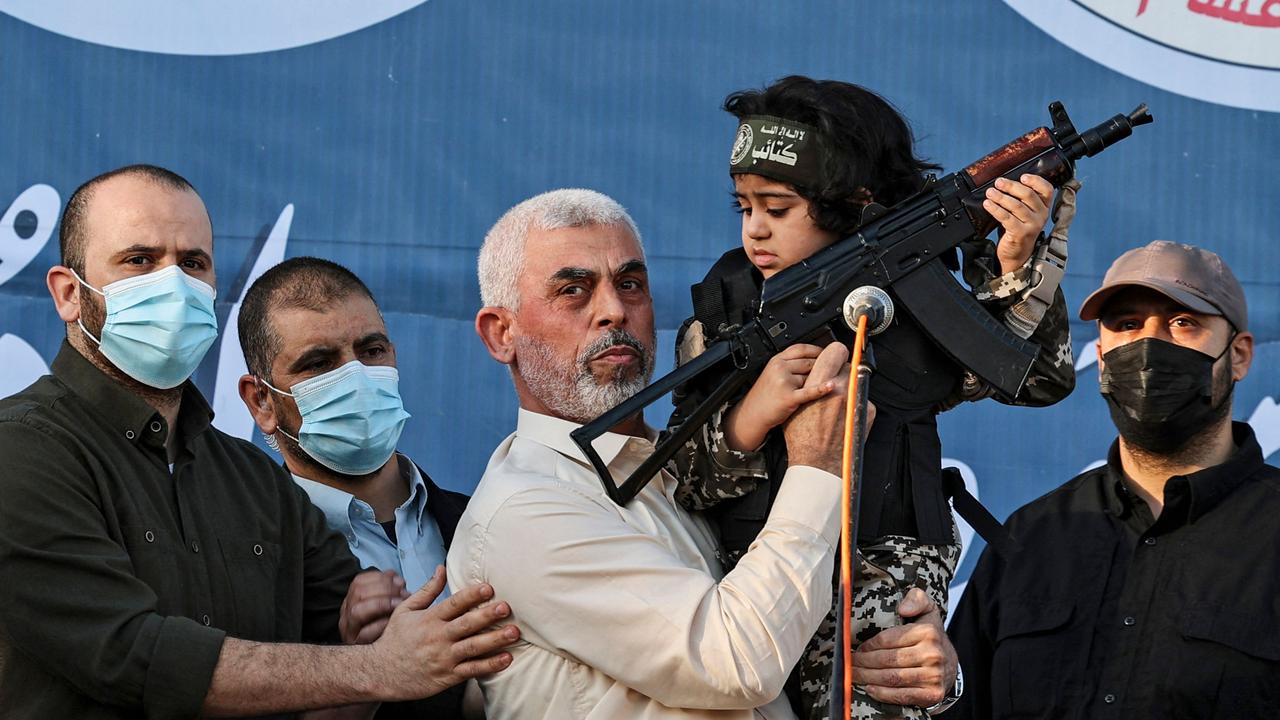Sydney Archbishop Kanishka Raffel’s devotion to peace
Sydney’s new Archbishop confronts a culture which is hostile and a Christianity which is in a kind of slow crisis in Australia.

When Andrew Hastie, the Assistant Defence Minister, was sent to Afghanistan as part of the SAS he had a few decisions to make. He wrote a letter to his wife, Ruth, sealed with wax and to be opened only if he was killed. He nominated the team to go and tell his wife this news, should the worst happen.
And he nominated the young Kanishka Raffel as the Anglican minister to take his funeral service, and asked that he preach on Lazarus, whom Jesus raised from the dead. Raffel, who last week was elected the Anglican Archbishop of Sydney, had been the Anglican vicar at St Matthew’s at Shenton Park in Perth, where Hastie and his wife worshipped.
Why did Hastie choose Raffel? “He’s a great preacher; he’s always closing on the Cross and that’s the centre of Christianity. He’s a wonderful example of how the Gospel brings us together.
“He understands the deep need of sinful man and preaches the Gospel of salvation.”
Everything about Raffel’s emergence as the Archbishop of one of the most important, and religiously conservative, Anglican dioceses in the world was unlikely.
Raffel was born in London of Sri Lankan parents and migrated as a small child to Sydney.
He was brought up as a Buddhist and was happily practising the meditation and rituals of that tradition when Christianity hit him like a thunderbolt. His friends from school and university were Christian and one of them asked him to read just one thing about Christianity.
He was expecting a book of C.S. Lewis or some such, but instead his friend got him to read the Gospel of St John. It gave him a sleepless night as he read it and re-read it, and by morning Raffel had become a Christian.
In a long conversation this week I asked Raffel why the words written by the Evangelist John 2000 years ago had such an effect on him: “I found the person of Jesus to be utterly overwhelming,” he says. “Jesus emerges from the Gospel as someone who provokes a response. At one point he says to his disciples — ‘will you too turn away from me’. They say no because you have the words of eternal life.”
Pretty much since then, Raffel has devoted his enormous human talent to the service of God through the Anglican Church. His conversion to Christianity wasn’t entirely easy for his family. His mother had been widowed when Raffel was a child.
“There was a kind if disappointment as well as a lack of understanding,” Raffel recalls now. “I managed to convince my mother I was not turning away from her or from my background as a person of Sri Lankan heritage.
“She came to see some good in it. And she came to appreciate the Christian community I was pastoring to for a very long time in Perth.”
Even being in Perth was an odd development. After his conversion, Raffel wanted to go straight into the service of the church — but a wise clergyman convinced him to finish his arts and law degrees and he practised law for a couple of years before undertaking theological training to become a minister.
The Sydney Anglican diocese is one of the great evangelical Anglican dioceses of the world. It holds strongly to the absolute truth and reliability of the New Testament and is positively countercultural in its insistence on the unchanging nature of core Christian belief.
Most Anglican dioceses in Australia are not so evangelical, but there are individual evangelical parishes all around the country. An informal network of contacts helps connect evangelical ministers with evangelical parishes, which is how Raffel ended up in Shenton Park.
His parish was a great success and at one point 10 per cent of Anglican churchgoers in Perth were attending Shenton Park. He had earlier been a curate, the junior priest, in the parish of Wanniassa in Canberra and there met and became friends with the former Nationals leader and deputy prime minister John Anderson.
At the time, Anderson was going through the terrible ordeal of the sickness, the short life and the untimely death of his youngest son. Like Hastie, Anderson has the highest regard for Raffel.
Says Anderson: “He’s a man of great intellect and great compassion and very practical at the same time. He combines a first class mind with a great degree of cultural understanding and patience. No reasonable person could object to him because he’s so respectful of others and he meets people where they’re at. It’s a very good appointment.”
It will need to be a good appointment because Raffel — like other Christian leaders in Australia — confronts a culture which is hostile and a Christianity which is in a kind of slow crisis throughout the West, and certainly in Australia.

For all that, Sydney Anglicanism is one of the great fixed points in global Christianity, and it has done much better than most elements of the church in Australia. The number of Anglican churchgoers each week in the Sydney diocese is about 60,000, and this number has been stable for a long time.
“The number is stable whereas most Anglican churches, and much of Christianity, has seen serious decline,” Raffel reflects. “But it’s also in a context where the population of Sydney is increasing. So our numbers have been steady but it is a smaller proportion of the population. We recognise we’re under tremendous pressure. But we’re not counting numbers for their own sake. We believe this (the message of the Gospels) is the best news around. We want people to hear it.”
I have known Raffel for a couple of years and can attest that one of his great attributes is a perennial cheerfulness. He’s good fun to be around. I have often found this with people who have converted to Christianity in adulthood; they are just so delighted at the wonder and the good news they’ve come upon. Yet he has a hard mind and does not deny the difficulties of Christianity in contemporary Western societies like Australia.
So what is his interpretation of our present cultural malaise? “As societies that were highly Christianised, we experienced a certain kind of approach to life that was good and benefited everybody, or most people, I suppose. The notions of the equality of all human beings, regardless of gender or wealth or race or access to power. The place of the individual, the dignity of individual conscience, the opportunity to pursue personal fulfilment, these were at root deeply Christian ideas.
“What has happened is that with technology, security and comfort people have been lulled into thinking that these are self-evident and inevitable truths.
“So as a society we have loosed ourselves not only from the Gospel of Jesus from which all these good things arise but from the posture of humbly acknowledging almighty God. We don’t humbly acknowledge anything anymore. The contents of the Gospel, including equality and human dignity, have been separated from a Christian world view. We have unleashed, ironically, a rejection of God from whom all these good things came.
“From a theological point of view, that is always our disposition; our bent is always to receive the good gifts of God but reject the giver. We have an in-built disposition to act this way, which the Bible calls sin.”

Raffel’s straightforward expositions and optimistic, force-multiplying enthusiasm allow him to confront all these difficulties without sounding too defensive or as if Christianity has lost the cultural, and more importantly the spiritual, battle: “I regard the decline of Christianity in the West not as a problem for Christianity but as a problem for the West.”
He is inspired by the radical growth of Christianity in much of the non-Western world, in Africa, in China, in other parts of Asia. And he doesn’t think the West looks so perfect it can scoff at societies where belief is more widespread: “This Australia which is so wealthy, so safe, so blessed, is full of anxiety, of depression, of terrible divisions between black and white, between rich and poor. And we’ve seen the widespread experience of women being treated so horrendously by self-gratifying men. There is a trail of wreckage and sorrow.
“I lament the decline of Christianity in the West not because I want Christianity to be more successful but because I want the community to be more at peace.”
He is alive to the many unresolvable contradictions in the secular view of life: “We’re now having this discussion about consent because of the terrible way so many women are exploited and abused by men. People think the solution is education, some proposing this begin even at kindergarten. On the other hand, we have all these proper concerns about children being exposed to sexual imagery, about the sexualisation of children.
“We’ve got these deep tensions because our commitment to personal autonomy has unleashed self-interested behaviour but we have no way of limiting this personal autonomy. The Apostle Paul describes self control as the fruit of the spirit. The #MeToo movement, empowered Western women, are saying we need men to exercise self control. The thing is we idolise personal autonomy in the West. Christianity teaches the dignity of the individual but it’s not absolutised because God himself, being a Trinity, exists in a community of love.”
Raffel has the personal capacity to make a serious contribution to the evolution of culture in Australia. He has this also now in the institutional position he occupies. But all of this arises only as a consequence of what is really a burning religious faith inside him.
When I ask him what is the core mission of an archbishop, he cites a passage from Matthew’s Gospel: “The risen Jesus says to his disciples, go and make disciples of all the nations and teach them to obey everything that I have taught you.”
There is nothing relativist or ambiguously obscure in the evangelical tradition or the personality of Sydney Anglicanism. Like everything else, it has its faults and failures, but you cannot feel that it doesn’t tell you what it really believes, or that it doesn’t really believe something of substance.
Raffel tells me he believes that Jesus was a historical person who was crucified and died and rose from the dead and later ascended into heaven. All the events recounted in the New Testament really happened, Jesus really uttered all the words attributed to him. And the consequences of these events and these words is revolutionary for human beings.
Raffel says: “Jesus sends his people into the world to announce that God has opened a way to reconciliation and peace between people and himself, that people can come to know his love through faith in Jesus.
“This is a broken and hurting world and the way to healing and hope and forgiveness is new life through coming into a reconciled relationship with God through trust in his son.”
Kanishka Raffel, soon to be Anglican Archbishop of Sydney, has a lot to say to us and miles and miles to go before he sleeps.
Read related topics:Afghanistan



